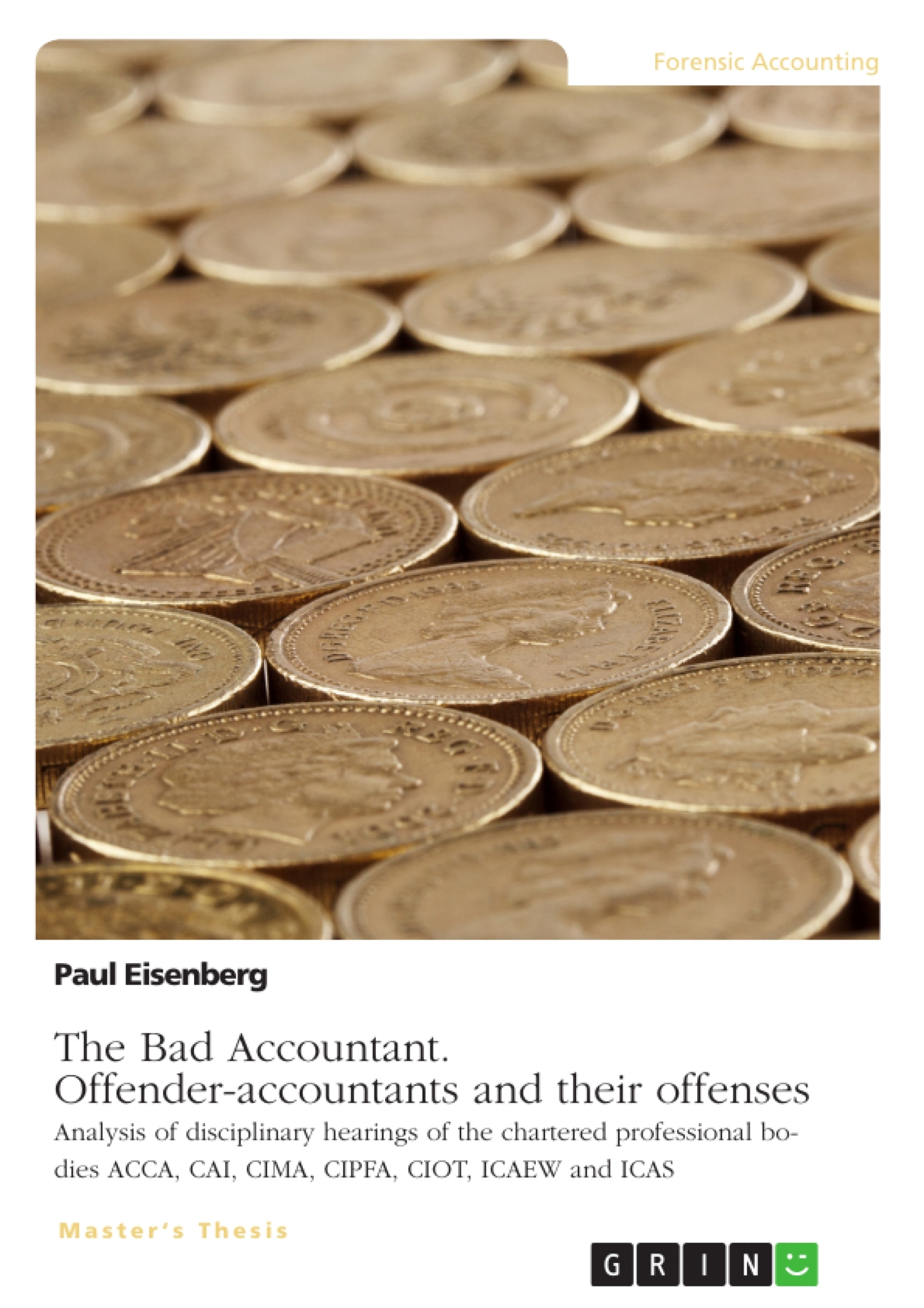This dissertation aims to analyze demographic characteristics of the homogeneous group of white-collar crime offenders, who are qualified accountants and members of the UK chartered professional bodies ACCA, CAI, CIMA, CIPFA, CIOT, ICAEW and ICAS. Beyond demographics, the crimes and infringements committed, the victims, the methods of detection, the duration of offense and the damages caused are elaborated, scrutinized and commented. The disciplinary, public administrative and criminal penalty regimes applied to offender-accountants are also subject of analysis.
The study examines 2,596 disciplinary documents by content analysis, that are published online by the UK chartered accountancy bodies, FRC, FCA/FSA and IS between January 2012 and June 2017. The total sample observed encompasses 1,390 chartered accountants.
The findings say that the typical culprit is male, around 45, practicing in a small firm and mainly guilty of disciplinary infringements. In case of financial and tax delinquency, ca. five offenses are committed over four years, causing average damages of £5,000,000-£6,200,000. The study reveals that female delinquency is significantly below the results of prior research. Moreover, a growing population of elderly offenders and enhanced recidivism among accountants are observed that are above official crime statistics.
The author is not aware of any study covering accountants from all UK chartered accountancy bodies. The results provide for opportunities of future research of offender-accountants, elderly criminality, recidivism among professionals and disciplinary policing regimes.
Table of Contents
- Introduction
- Background of the subject
- Outline of the research aims and objectives
- Rationale for the research questions
- Outline of the structure of the dissertation
- Literature review
- Outline of the literature review
- Studies on characteristics of offender-accountants
- Studies on characteristics of white-collar criminals
- Methodology
- Research design
- Methods of data collection
- Methods of data analysis
- Advantages and disadvantages of the methods used
- Ethical considerations
- Results
- Personal characteristics
- Age
- Gender
- Marital status
- Educational level
- Addiction
- Professional standing
- Occupational rank
- Length of service
- History of previous offenses
- Victimology
- International scope of offenses
- Study of offenses
- Financial offenses (FINANCE)
- Audit related offenses (AUDIT)
Objectives and Key Themes
This dissertation aims to analyze demographic characteristics of qualified accountant offenders who are members of UK chartered professional bodies. It goes beyond demographics to examine the crimes committed, victims, detection methods, duration of offenses, and damages caused. The disciplinary, public administrative, and criminal penalty regimes applied to offender-accountants are also analyzed.
- Demographic characteristics of offender-accountants
- Crimes and infringements committed by offender-accountants
- Victimology of offenses committed by offender-accountants
- Methods of detection and duration of offenses
- Disciplinary, public administrative, and criminal penalty regimes applied to offender-accountants
Chapter Summaries
The first chapter introduces the subject of offender-accountants and outlines the research aims, objectives, and questions. It also provides a structural overview of the dissertation. Chapter two presents a comprehensive literature review, examining existing studies on the characteristics of offender-accountants and white-collar criminals. Chapter three details the research design, data collection methods, data analysis techniques, and ethical considerations. Chapter four presents the results of the study, focusing on the personal characteristics, professional standing, victimology, international scope of offenses, and a detailed analysis of financial and audit-related offenses.
Keywords
This dissertation focuses on offender-accountants, white-collar crime, disciplinary hearings, chartered professional bodies, demographic characteristics, financial offenses, audit-related offenses, victimology, penalty regimes, and the analysis of disciplinary documents.
Frequently Asked Questions
What are the typical characteristics of an "offender-accountant"?
The study found the typical culprit is male, around 45 years old, and usually practicing in a small firm. They are often members of professional bodies like ACCA or ICAEW.
What types of crimes do these accountants typically commit?
The offenses range from disciplinary infringements to serious financial and tax delinquency, including audit-related fraud and misappropriation of funds.
How much damage is caused by financial crimes committed by accountants?
In cases of financial and tax delinquency, the average damages recorded in the study ranged between £5,000,000 and £6,200,000.
How long do these offenses typically last before detection?
On average, financial crimes involve about five individual offenses committed over a period of approximately four years.
Is recidivism a problem among professional accountants?
Yes, the study observed enhanced recidivism among accountants, with rates higher than general official crime statistics would suggest.
What penalty regimes are applied to offender-accountants?
They face a combination of disciplinary sanctions from professional bodies, public administrative penalties, and in serious cases, criminal prosecution.
- Citation du texte
- Paul Eisenberg (Auteur), 2018, The Bad Accountant. Offender-accountants and their offenses, Munich, GRIN Verlag, https://www.grin.com/document/453024



